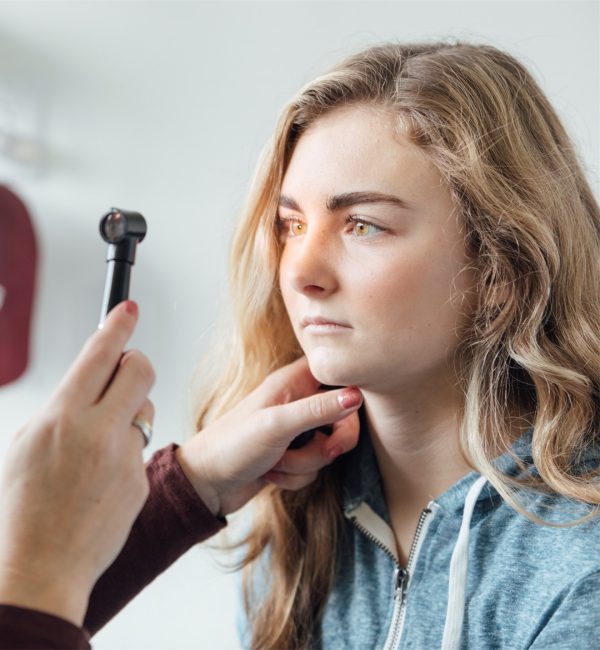Nutrition Intervention Can Protect Vision
by Christine Craig, MS, RD, CDCES
Recent research highlights the role of diet in preventing and slowing the progression of diabetes retinopathy, which is the leading cause of vision impairment among individuals with diabetes.
While glucose management is essential in reducing the risk of retinopathy, nutritional strategies that target reduced glycemic variability, blood pressure, inflammation, and oxidative stress significantly impact retinal health and vision.
In 2021, it was estimated that 26.43% of individuals with diabetes in the US have diabetic retinopathy, and 5.06% of individuals have vision-threatening diabetic retinopathy.1

Non-Proliferative and Proliferative Retinopathy
Clinically, diabetic retinopathy presents as non-proliferative diabetic retinopathy (NPDR) and proliferative diabetic retinopathy (PDR).
- NPDR occurs in the early stages when blood vessels in the retina weaken, and microaneurysms occur, but there is no new blood vessel growth.
- PDR is when there is a “proliferation” of new blood vessel growth in the retina, and these unstable vessels break and bleed into the vitreous, causing severe vision loss. PDR requires urgent and ongoing medical treatment.
Chronic hyperglycemia, dyslipidemia, nephropathy, and hypertension are factors that increase the risk of diabetic retinopathy.3 In type 1 diabetes, the DCCT and EDIC studies identified that higher mean HgbA1c is the strongest predictor of retinopathy progression. A 1% reduction in HgbA1c was associated with a 35% reduction in the risk of developing diabetic retinopathy.
Eye Screening Guidelines
Screening is essential; 2019 data indicates that 64.8% of individuals with diabetes had completed an eye exam in the past 12 months.2
The ADA Standards of Care recommends that adults with type 1 diabetes be screened within five years of diagnosis and individuals with type 2 diabetes be screened at the time of diagnosis. followed by an annual screening. If the eyes are healthy on exam and glucose is within the target range, eye specialists can consider extending screening to every 2 years.3
Diet and Retinopathy Risk
An individual’s diet plays in important role in retinal health.
Research has associated the consumption of fatty fish, fruits, vegetables, and antioxidant-rich foods with a reduced risk of diabetic retinopathy.4
In contrast, dietary patterns that contribute to glucose elevation and increase advanced glycation end-products (AGEs) contribute to retinal inflammation and microvascular damage.4 Focus on dietary interventions that support glycemic, lipid and blood pressure management help reduce risks or slow profession of this condition.3
Just as in general diabetes management, no one diet pattern is recommended; however, there is some evidence for specific nutrients. Research on nutrients such as omega-3 fatty acids, fiber, lutein and zeaxanthin, Vitamin C, Vitamin E, and Zinc have shown positive association with lowering diabetic retinopathy risk.4 To meet these nutrient needs, whole food-based diets rich in vegetables, whole grains, legumes, lean proteins, and healthy fats may be considered.
The Dietary Inflammatory Index (DII)
The Dietary Inflammatory Index (DII) is a scoring system that measures the inflammatory potential of individual diets based on 45 parameters, including various macronutrients, micronutrients, and phytochemicals. Liu and colleagues5 found that a one-point increase in the DII score was associated with 38% increased odds of having diabetic retinopathy. Their research also noted the relationship between higher HbgA1c, duration of diabetes, and increased retinopathy risk. While the research used NHANES data, the small sample size and retrospective cross-sectional analysis limit the ability to conclude causation.
We can consider the benefits of increasing anti-inflammatory foods and decreasing inflammatory foods, but additional information is needed to implement direct recommendations.
Role of Diabetes Educators in Prevention
As Diabetes Care and Education Specialists (DCES), we can support the prevention of diabetic retinopathy by helping individuals manage glucose through dietary patterns to reduce risk and slow progression. Although barriers exist to adopting anti-inflammatory diets rich in whole foods, antioxidants, and essential nutrients, understanding the potential connection beyond glycemic management can guide additional nutrition interventions.
Programs that support retinal photography with remote reading can increase access to screening in areas lacking accessible services. Additionally, ensuring blood pressure, lipid and renal screening and management, understanding the role of physical activity, and long-term glucose management can support vision health. DCES can empower patients to make sustainable lifestyle changes that support retinal health through individualized counseling and interdisciplinary collaboration with eye care providers.
References:
- Lundeen EA, Burke-Conte Z, Rein DB, et al. Prevalence of Diabetic Retinopathy in the US in 2021. JAMA Ophthalmol.2023;141(8):747–754. doi:10.1001/jamaophthalmol.2023.2289
- Healthy People 2030 Data Report. Downloaded on October 18th 2024 from https://odphp.health.gov/healthypeople/objectives-and-data/browse-objectives/diabetes/increase-proportion-adults-diabetes-who-have-yearly-eye-exam-d-04
- American Diabetes Association Professional Practice Committee; 12. Retinopathy, Neuropathy, and Foot Care: Standards of Care in Diabetes—2024. Diabetes Care1 January 2024; 47 (Supplement_1): S231–S243. https://doi.org/10.2337/dc24-S012
- Bryl A, Mrugacz M, Falkowski M, Zorena K. The Effect of Diet and Lifestyle on the Course of Diabetic Retinopathy-A Review of the Literature. 2022 Mar 16;14(6):1252. doi: 10.3390/nu14061252. PMID: 35334909; PMCID: PMC8955064.
- Liu, R., Zhang, J., Gu, W. et al.Dietary Inflammatory Index and diabetic retinopathy risk in US adults: findings from NHANES (2005–2008). BMC Ophthalmol 24, 46 (2024). https://doi.org/10.1186/s12886-024-03303-1










